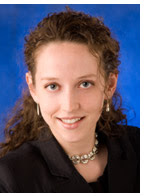The startle reflex test was never a very reliable means to assess an infant's hearing and it certainly did not rule out hearing loss of all types and degrees. Thankfully technology and research has brought about a new way to evaluated newborn hearing status.
One of the most common ways to test an infant in the hospital nursery is with otoacoustic emissions (OAEs) testing. Otoacoustic emissions are like little "echos" that are reflected back from sound stimulating the cochlea (the cochlea is the hearing organ). These "echos" are a by product of a healthy cochlear amplifier. In other words... a healthy ear will send back an echo that can be measured without the patient having to do anything except remain still and quiet for a minute or two.
There are limitations to this test as it will not rule out mild hearing loss and in some cases infants will pass this evaluation in the nursery. Mild hearing loss can be a significant barrier to a child's development of language, speech and reading skills. If your child passed the nursery newborn hearing screening but later shows signs of struggling with learning to talk or later still when in school have their hearing re-evaluated.
Additionally it is possible to fail this test and still have normal hearing. OAEs are very small echos and are impacted by other problems such as fluid in the ear or noisy breathing. When an infant fails a screening in the newborn nursery it is important to follow up as instructed and remember that routine screenings are helpful at identifying children with hearing loss at a young age but will sometimes be incorrect.
When an infant fails an OAE screening in the nursery there is another test that is often performed called auditory brainstem response (ABR) testing. This is an excellent way to evaluated hearing sensitivity and can be used routinely or when OAEs fail. However, the test is more complex and requires a soundly sleeping baby. Electrodes are attached to the head and sounds are played while brainwaves are analyzed. Assuming that this test can be completed without the baby waking up it will give a better picture of the hearing status. Since many babies are discharged within 48 hours it is not always possible to perform a complete ABR and a referral for more testing will be given if your child is identified for follow up. Again, it is important to follow up as instructed. Hearing loss effects 1 in 10 people and in young children is can impact development on many levels.
Hearing screenings for newborns are now provided in hospitals around the country routinely. When I was born that was not the case. My hearing loss was not discovered until I was 4 years old. I struggled as a young child in learning to read, I needed speech therapy and I sometime feel that I never caught up with my peers on a social level so I am very thankful for the newborn screenings that will help identify children with hearing loss sooner and give them more complete exposure to the hearing world when it matters most.
Here are some great resources on the web:
Boys Town National Research Hospital
http://www.babyhearing.org/
Centers for Disease Control and Prevention
http://www.cdc.gov/ncbddd/ehdi/
This blog posted by Suzanne Yoder, Au.D. Doctor of Audiology and owner of HearWell Center. Please visit our website for more information http://www.hearwellcenter.com/

